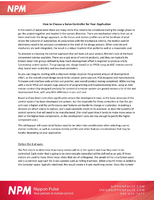Governor Pence signs interchangeable biologic medicine bill.
Share:
Press Release Summary:
BIO and the Indiana Health Industry Forum commend Indiana Governor, Mike Pence for signing legislation designed to create pathway for substitution of interchangeable biologic medicines. Policies outlined in Senate Bill 262 align with all 5 of BIO’s principles on biologic substitution. Bill seeks to properly preserve patient access to accurate prescription information, maintains incentives for innovation, and promotes competitive market for biologic therapies.
Original Press Release:
Governor Pence Signs Bill Granting Patient Access to Interchangeable Biologic Medicines
Transparent communication important for Patients and Physicians
WASHINGTON--The Biotechnology Industry Organization (BIO) and the Indiana Health Industry Forum (IHIF) commend Indiana Governor Mike Pence for signing legislation today designed to create a pathway for the substitution of interchangeable biologic medicines.
“Senate Bill 262 received overwhelming bipartisan approval and was supported by a broad coalition of biologic and biosimilar manufacturers, along with industry, physician and patient groups”
The policies outlined in Senate Bill 262 align with all five of BIO’s principles on biologic substitution. BIO and IHIF furthermore commend Indiana’s Senate and House of Representatives for passing this bill by wide margins earlier this year.
"Senate Bill 262 received overwhelming bipartisan approval and was supported by a broad coalition of biologic and biosimilar manufacturers, along with industry, physician and patient groups," said Jim Greenwood, BIO’s President and Chief Executive Officer. "By signing this bill into law, Governor Pence added Indiana to a growing list of states, including Florida, Virginia, Oregon, Utah, and North Dakota, that have taken a leadership position in allowing commercial pharmacies to dispense this class of cutting-edge medical therapy."
While the U.S. Food and Drug Administration (FDA) oversees approval of biologic medicines and designation of interchangeability, policies governing whether one product may be substituted in place of a doctor's prescription and whether a pharmacist must inform patients and doctors are covered by state law. Senate Bill 262 seeks to properly preserve patient access to accurate prescription information, maintains incentives for innovation and promotes competitive market for biologic therapies. BIO will continue to advocate for full transparency in the substitution process as patients and their physicians should have the right to know what biologic medicine the patient receives from the pharmacy.
The FDA is currently developing a pathway for the development and approval of safe and effective interchangeable biologic products in the United States. However, there is still a major role for states to play in ensuring substitution practices remain transparent and physicians remain engaged in the process.
"Interchangeable biologics are not generics. Even slight changes to a biologic drug can change its properties entirely," said Greenwood. "Unlike conventional generic medicines, interchangeable biologics are not the same as the drugs they seek to substitute. In fact, two biologics made using different cell lines and differing manufacturing processes will rarely, if ever, be exactly the same. Those suggesting interchangeable biologics and generics are the same are wrong."
Patients and physicians managing chronic conditions are generally aware of which biologic treatments work best in their unique circumstances. Communicating with patients and physicians allows everyone involved the opportunity to discuss past treatment experiences so that any possible unexpected issues can be better understood and avoided.
As other states continue to address issues related to biologic substitution, BIO encourages policy makers to continue to put patients first.
About BIO
BIO represents more than 1,100 biotechnology companies, academic institutions, state biotechnology centers and related organizations across the United States and in more than 30 other nations. BIO members are involved in the research and development of innovative healthcare, agricultural, industrial and environmental biotechnology products. BIO also produces the BIO International Convention, the world’s largest gathering of the biotechnology industry, along with industry-leading investor and partnering meetings held around the world. BIO produces BIOtechNOW, an online portal and monthly newsletter chronicling “innovations transforming our world.” Subscribe to BIOtechNOW.
About IHIF
The diverse members of the Indiana Health Industry Forum generate the collective voice of the state’s health and life science industry. The Forum connects key stakeholders to enhance business networks, advocate for member interests, develop workforce skills, and provide strategic vision in the interest of growing the state’s health industry economy and reputation. IHIF is the Indiana affiliate of the Biotechnology Industry Organization. To learn more, please visit www.ihif.org.
Contacts
Biotechnology Industry Organization (BIO)
George Goodno, 202-962-6660
Web: www.bio.org
Blog: www.biotech-now.org
Twitter: @IAmBiotech




